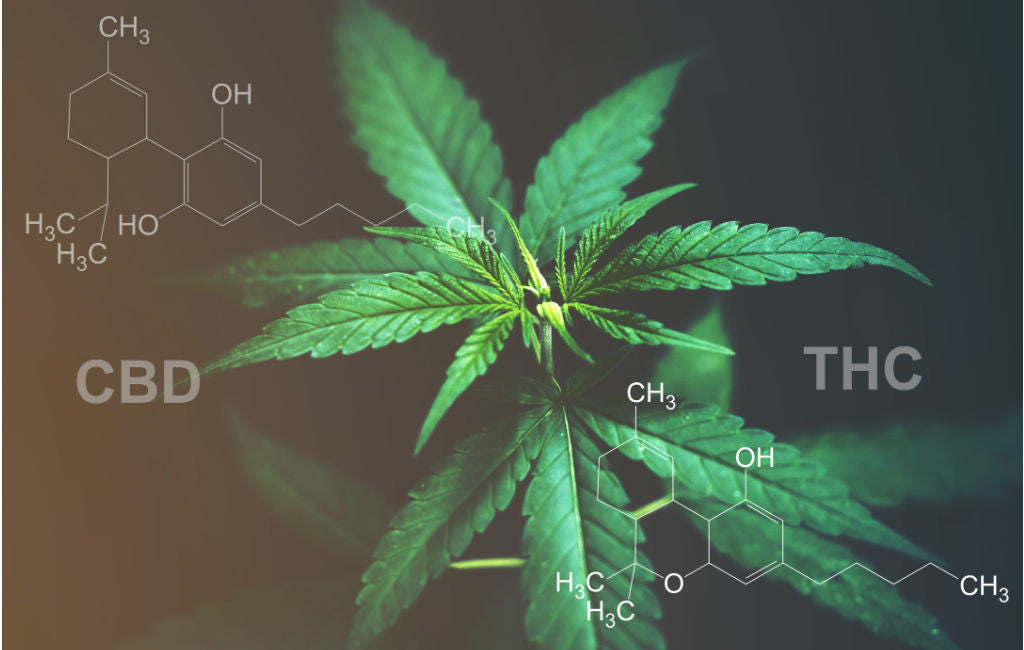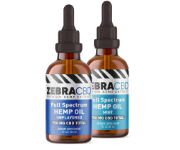
If you’re new to the world of CBD, you may be wondering whether you’ll experience a “high” when taking it. The short answer? CBD will not make you high. The long answer, on the other hand, has to do with the differences between CBD and THC. Although they come from the same source, they have dissimilar properties.
In this guide, we’ll show you the definitive differences in CBD vs. THC. By the time you’re done reading, you’ll know how these two cannabinoids affect your body as well as what to look for in a quality CBD product.
Cut From the Same Plant Family
To explain the nuances between THC and CBD, it’s important to understand where they come from and their relationship to the cannabis plant family.
Breaking Down Cannabis Terminology
Hemp, marijuana and cannabis... You’ve probably heard all three of these terms used interchangeably. Are they all the same thing? Well, yes and no.
THC is psychotropic (i.e., it induces feelings of euphoria and being“high”) and CBD is not.
The cannabis plant is a member of the Cannabaceae plant family. Both THC (tetrahydrocannabinol) and CBD (cannabidiol) are cannabis-derived compounds. But it’s the THC content that determines whether the plant is classified as hemp or marijuana.
- Marijuana is produced from the leaves and flowers of cannabis plants that contain more than 0.3% THC, with some strains containing as much as 40% THC.
- Hemp is a variety of the cannabis plant that contains less than 0.3% THC and is the source of legal CBD.
They’re Both Phytocannabinoids
A simpler way to sift through the terminology and categorization of cannabis vs. hemp vs. marijuana is to consider this: THC and CBD are both phytocannabinoids. Phytocannabinoids are the chemicals found in cannabis plants. Scientists have identified more than 100 phytocannabinoids, but THC and CBD are the best known. As UCLA Health notes: “The most well-known cannabinoid is delta-9-tetrahydrocannabinol (THC), which is responsible for the “high” of cannabis and can affect perception, mood, emotion, cognition, and motor function. But there are also cannabinoids like cannabidiol (CBD) which are non-psychoactive yet have been demonstrated to possess medically useful properties.”
When breaking down what it means to interact with either CBD or THC, there’s a very important distinction: THC is psychotropic (i.e., it induces feelings of euphoria and being“high”) and CBD is not.
Defining Differences: THC vs. CBD and the ECS
While THC produces the “high” associated with marijuana use, what’s CBD known for? It all comes down to how it interacts with our endocannabinoid system (ECS).
Understanding the ECS
Just like cannabis plants contain phytocannabinoids, human bodies contain cannabinoids of their own, known as endocannabinoids. These compounds make up the ECS, which contains three key parts:
- endocannabinoids – Naturally occurring neurotransmitters that bind to cannabinoid receptors throughout the central nervous system (CNS) and peripheral nervous system (PNS).
- cannabinoid receptors – These exist throughout our bodies and interact with endocannabinoids as well as cannabinoids, impacting physiological processes like appetite, mood, memory and sensation.
- enzymes – These are critical to metabolization processes, breaking down both cannabinoids and endocannabinoids in our bodies. The two major enzymes in the ECS are fatty acid amide hydrolase and monoacylglycerol acid lipase.
What does this three-pronged system do, exactly? Its most important function is to create internal homeostasis, or balance. Some of the things the ECS is known to regulate include:
- mood
- digestion
- appetite
- metabolism
- sleep
The purpose of the ECS is to create harmony among our physiological systems. This includes everything from keeping your digestion in order to regulating your body temperature.
Where That ‘High’ Feeling Comes From
THC is the main chemical compound in marijuana responsible for its psychoactive effects.
When you introduce THC into your body, it attaches to an ECS receptor known as the CB1 receptor. This stimulates cells in the brain, inducing them to release dopamine. Simultaneously, it impedes information processing within the hippocampus, causing many of the common side effects of marijuana use, including:
- euphoria
- relaxation
- hunger
- heightened senses
- distorted sense of time
- decreased motor skills
- lowered inhibitions
- impaired focus
- short-term memory loss
The relationship between CBD and our ECS is different. While CBD does interact with cannabinoid receptors, it doesn’t directly attach to them. This, combined with its lack of psychotropic properties, is why CBD doesn’t get you high; instead, it has a calming effect on the ECS, which can be beneficial in numerous ways.
The Benefits of CBD Over THC
CBD and THC have different chemical properties and thus have different effects on the body’s ECS. But the benefits can be remarkably similar. Shared benefits can include helping with:
- everyday wellness
- muscle soreness and discomfort
- improved sleep
- promoting feelings of calm and relaxation
However, because CBD doesn’t have the intoxicating effect associated with marijuana, many users prefer it when it comes to the daily support of their health and wellness.
Athletic Performance and Recovery
A health benefit of CBD is its ability to help combat exercise-induced inflammation in the body, which is a huge source of pain relief for serious and casual athletes alike.
Whether you’re just a casual gym-goer or a hardcore weightlifter, using CBD before or after these activities can help reduce and ease the inflamed and achy muscles that follow a tough workout. Less time dealing with tenderness and inflammation means you can resume your normal workout routine sooner.
Restful Sleep
For those struggling to fall or stay asleep at night, CBD can help you drift off and get the sleep you need. Once asleep, it can help you maintain a deep and restful sleep cycle.
CBD is known to have a calming effect on the nervous system, which means taking CBD before bedtime can help promote relaxation and calmness.
Improved Mood and Focus
While there’s no single best time of day to take CBD oil, the calming effect of CBD can be beneficial during waking hours as well. An increased feeling of calm can be just what you need when you experience jitters before a big event or need a breather from a stressful week at work. CBD can provide a welcome reset and a sense of ease, which can also have a positive impact on your ability to focus and think critically.
The Legality of CBD and THC
One of the final major differences between CBD and THC is their legal status. CBD is legal nationwide, whereas marijuana is legal only in certain states.
The 2018 Farm Bill had significant ramifications on the cultivation and sales of hemp-based CBD products. It made three major changes to CBD’s legal status:
- It set limits that said in order to be legally considered hemp-based CBD, the product must contain less than 0.3% THC.
- It changed hemp and CBD from a Schedule 1 drug classification, lifting many of the restrictions associated with the possession, sale and transport of hemp-based products.
- It legalized both the cultivation and transportation of hemp-based products across the country.
While marijuana laws and sentiment concerning the product are shifting, it’s not yet legal nationwide. As of this writing, adult medical marijuana use is legal in 33 states and recreational marijuana use is legal in 11 states. But even in those states where it is decriminalized, driving while high will still result in a DUI charge due to its psychoactive effect. CBD, on the other hand, doesn’t have any such stipulations surrounding it (so long as it’s hemp-based).
Similarly, even in states where marijuana is legal, many employers screen for drug use. CBD typically won’t show up on a standard drug screening panel, whereas THC will.
Deciding on the Best CBD Applications For You
When you’re trying to figure out which CBD products are your best bet, it will likely take some experimentation. But there are some specific features to look for when you’re shopping for CBD.
Quality Ingredients
Like anything you eat or take for wellness, it’s important to consider the quality of the CBD product you’re considering. Key features that distinguish the best CBD oil products from the rest of the pack include:
- high-quality formulas free of contaminants. effective and healthy carrier oils
- less than 0.3% THC
- transparency in CBD oil sourcing
You’ll find all of these must-have requirements in Zebra CBD products, which feature a Label Accuracy Guarantee™. What does this mean? It means that what you see on the label is exactly what you can expect from the product you choose. We achieve that by:
- using third-party labs to test and verify CBD and THC content.
- conducting rigorous testing to make sure there are no contaminants such as pesticides.
- sourcing American-grown, organic hemp.
Zebra CBD: Your CBD Product Experts
We understand that shopping for CBD may seem complicated. But we’re here to explain and demystify everything you’re confused about, whether that’s the fundamental differences in THC vs. CBD or what the hallmarks are for a truly great CBD product.
If you need product recommendations or assistance, we’re here to answer your questions about any of our CBD topicals, edibles or oils, which are all backed by our Label Accuracy Guarantee™.
Source:
Healthline. CBD vs. THC: What’s the Difference? https://www.healthline.com/health/cbd-vs-thc
VeryWellHealth. What Is the Endocannabinoid System? https://www.verywellhealth.com/what-is-the-endocannabinoid-system-4171855
UCLA Health. Cannabis and Its Compounds. https://cannabis.semel.ucla.edu/compunds/
FDA. Hemp Production and the 2018 Farm Bill. https://www.fda.gov/news-events/congressional-testimony/hemp-production-and-2018-farm-bill-07252019
Business Insider. Legal Marijuana States. https://www.businessinsider.com/legal-marijuana-states-2018-1









